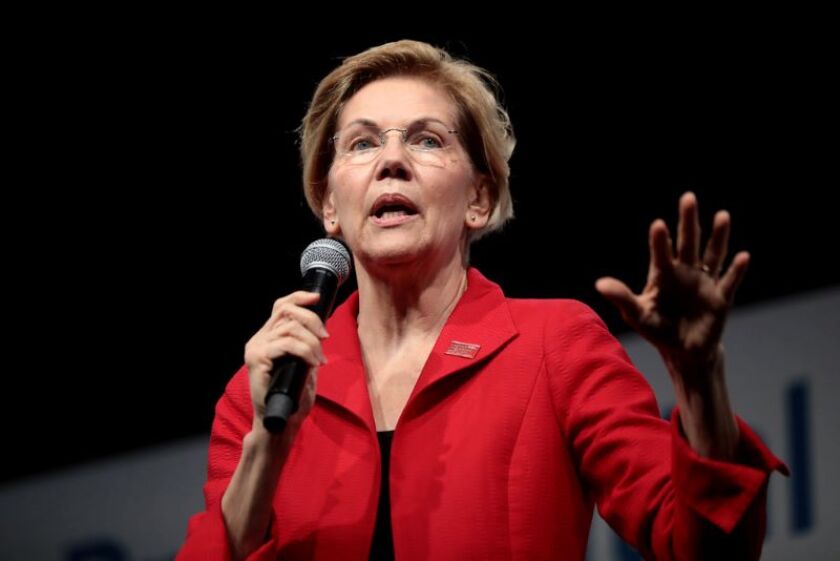On October 8, 2019, Senator Elizabeth Warren was the frontrunner to be Democratic nominee for the upcoming US election. By March, she had dropped out of the race. In May, she endorsed Democratic nominee Joe Biden.
Since then she has played a central role in Biden's campaign, working closely with him to ensure that the Democratic Party united behind his bid for the White House and even provided some of the policies he has proposed. Since March, there have been regular discussions about what role the most vocally anti-Wall Street Senator would be given – or would want – within a Biden administration.
See also: What a Biden/Harris admin would mean for the regulators
Although Senator Kamala Harris got the nod as Vice President ahead of Senator Warren, it is highly likely that Warren would play an important role in a Biden administration. Biden has stated very adamantly that he intends to unite all Americans, which includes Warren's progressive left – which he needs her to bring into the fold.
Treasury secretary
One possibility is that Warren will be nominated as Treasury Secretary, a position likely to be vacated by Steven Mnuchin following a change in the White House.
On October 29, Politico reported that Warren is keen to take on the role, and will suggest to Biden that she take on the position if he wins next week.
A recent article from NBC News suggested that progressives on the left were pushing hard for Warren to fill the role because of her vocal anti-Wall Street stance – and because she was open to the nomination.
"There's a huge gap between Senator Warren and any other likely candidate," Larry Cohen, former President of the Communications Workers of America union told NBC. "She, first of all, understands finance capital and, second of all, is prepared to wrangle with it."
Democratic Congressmen Barney Frank, however, believes choosing Senator Elizabeth Warren as Treasury Secretary would be a mistake – simply because the former Harvard lecturer and Presidential nominee's talents would be wasted in the role.
See also: What Biden/Harris admin would mean for the regulators
"I would like her to stay in the Senate. Frankly, at this point, there are many more important issues facing the country than financial regulation," he said. "The whole problem of inequality and housing, I would like to see Elizabeth Warren focus on that."
“I don’t think having her fight for more financial regulation is nearly as important as putting her on a broader range of issues or getting rid on inequalities. You can't do that from the Treasury, but you can do that as a Senator."
"Having her in a major fight over the specifics of financial regulation is not – in my judgement – a good use of her enormous talents."
Whether she would be nominated and accept this position would also depend on the composition of the Senate following next week's election.
Sam Ramer, former senior associate to the President during the early years of the Trump administration, now partner at Norton Rose Fulbright in Washington DC, stressed the importance of the Senate majority.
"We don’t know if the Democrats are going to take the Senate or not. It is very, very close. It would be very tough to put Senator Warren in any executive branch position, because the Governor of Massachusetts is a Republican and could therefore appoint a Republican to replace her temporarily," he said.
See also: What a Biden/Harris administration would mean for financial regulation
"It really all depends on what the makeup of the Senate is, because if it is very close, there may be heavy pressure on her to stay rather than shift the balance," he added. "If the Democrats feel they have a solid majority, they might be able to risk it – but even then, they would think very carefully about it as a party."
Close ties
Elizabeth Warren worked closely with the Obama administration. In 2010, President Obama appointed Warren to serve as assistant to the President and special adviser to the Secretary of the Treasury on the Consumer Financial Protection Bureau (CFPB). In March, Biden endorsed a bill from Warren that sought to reshape the bankruptcy system in the US.
Warren and Vice President Biden have been open about their intentions to work together. If she does not assume the role of Treasury Secretary, she may take on a cabinet position instead.
"They built a very solid relationship during the primaries and since. Vice President Biden seriously values Senator Warren's perspective and input, and I believe that would be reflected in his administration policies," said Dennis Kelleher, President and CEO of Better Markets.
Other areas of regulatory reform that Biden and Warren see eye to eye on include re-imposing Glass-Steagall’s separation of retail and investment banking, and reforming the Community Reinvestment Act.
"Overall there will be pretty broad agreement between Biden and Senator Warren on their goals. They have some differences of opinion about how to achieve those goals, but broadly speaking, there will be more agreement than disagreement," added Kelleher.
"Senator Warren has been very vocal in her calls for a robust response to the pandemic, and in her support of increased oversight and accountability of pandemic programmes. Biden will agree with all of that."
Consumer protection
The CFPB would likely be one of the first beneficiaries of a Biden/Harris administration. Originally Warren's brainchild, the bureau was ratified by the Dodd-Frank Act and signed into existence by President Obama and Vice President Biden. The Trump administration has taken steps to undermine the bureau's position as a consumer watchdog, and in appointing Mick Mulvaney and later Kathleen Kraninger as director made it absolutely clear that running the bureau as originally intended was not a priority.
Acting director Mulvaney made no secret of the fact he was decidedly anti-consumer, and since her confirmation, Kraninger has continued the policies of her predecessor.
See also: CFPB likened to predator protection agency under Kraninger's watch
"It is being transformed from a consumer protection agency into a predator protection agency," said Kelleher in 2019.
"Kraninger's policies and actions have all been designed to comfort the industry and lawbreakers, and to let consumers know that the CFPB is no longer going to be the cop on the consumer protection beat that it has been for the last six years," added Kelleher.
It is unlikely that Warren will take on the position of CFPB director, but she will certainly put pressure on Biden to make sure that the bureau works as intended and that whoever takes on the role has its best interests at heart.
"At the CFPB, there is currently a director who does not think that the agency should exist, so she is going to be history. My guess is whoever Biden would put in would be somebody who actually believes in the mission of the CFPB," said James Angel, professor of finance at Georgetown University.
"We can expect the CFPB to be turned into a more pro-consumer agency at that point."
If Biden secures the White House, it will not be with Warren at his side as Vice President, but it is unlikely she will be too far away.
See also: Dodd-Frank still as relevant as ever

